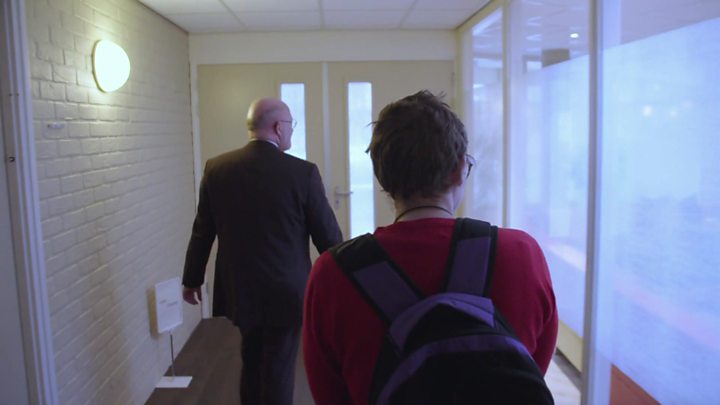
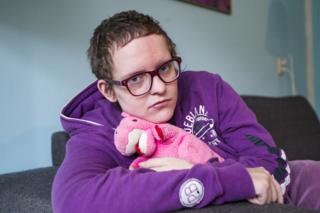
Image copyright
Ronald Hissink/De Stentor
In January a young Dutch woman drank poison supplied by a doctor and lay down to die. Euthanasia and doctor-assisted suicide are legal in the Netherlands, so hers was a death sanctioned by the state. But Aurelia Brouwers was not terminally ill – she was allowed to end her life on account of her psychiatric illness.
“I’m 29 years old and I’ve chosen to be voluntarily euthanised. I’ve chosen this because I have a lot of mental health issues. I suffer unbearably and hopelessly. Every breath I take is torture…”
A team from the Dutch TV network, RTL Nieuws spent two weeks recording Aurelia as she journeyed towards her date with death – 2pm on Friday, 26 January. On a whiteboard in her home, she crossed off the days with a heavy black marker pen.
During those last weeks, she spent her time with loved ones, doing craftwork and riding her bike in Deventer, the city she adored. She also visited the crematorium – the place she had chosen for her own funeral service.
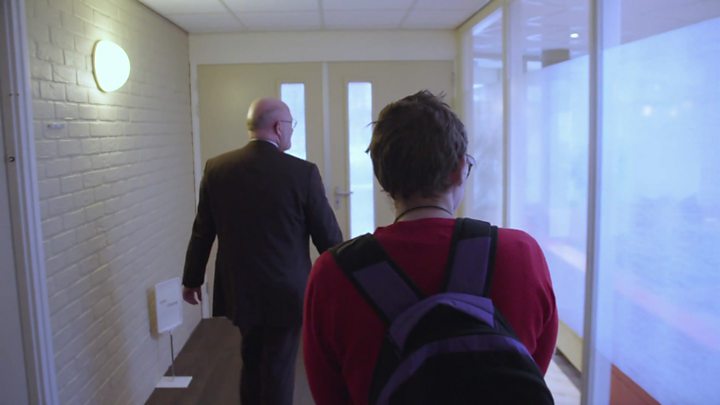
In many ways her story is uniquely Dutch. Euthanasia is against the law in most countries, but in the Netherlands it is allowed if a doctor is satisfied a patient’s suffering is “unbearable with no prospect of improvement” and if there is “no reasonable alternative in the patient’s situation”.
These criteria may be more straightforward to apply in the case of someone with a terminal diagnosis from untreatable cancer, who is in great pain. And the vast majority of the 6,585 deaths from euthanasia in the Netherlands in 2017 were cases of people with a physical disease. But 83 people were euthanised on the grounds of psychiatric suffering. So these were people – like Aurelia – whose conditions were not necessarily terminal.
Aurelia Brouwers’ wish to die came with a long history of mental illness.
“When I was 12, I suffered from depression. And when I was first diagnosed, they told me I had Borderline Personality Disorder,” she says. “Other diagnoses followed – attachment disorder, chronic depression, I’m chronically suicidal, I have anxiety, psychoses, and I hear voices.”
Aurelia’s doctors would not endorse her requests for euthanasia. So she applied to the Levenseindekliniek – the End of Life Clinic – in The Hague. This is a place of last resort for those whose applications have been rejected by their own psychiatrist or GP. The clinic oversaw 65 of the 83 deaths approved on psychiatric grounds in the Netherlands last year, though only about 10% of psychiatric applications are approved, and the process can take years.
“The psychiatric patients we see are younger than others,” says Dr Kit Vanmechelen, a psychiatrist who assesses applicants and performs euthanasia, but was not directly involved in Aurelia’s death.
“Aurelia Brouwers is an example of a very young woman. And that makes it harder to make the decision because in those cases, you take away a lot of life.”
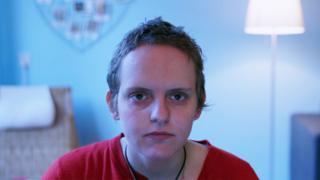
Image copyright
RTL Nieuws, Sander Paulus
During her last two weeks of life, Aurelia was often distressed and had self-harmed.
“I’m stuck in my own body, my own head, and I just want to be free,” she said. “I have never been happy – I don’t know the concept of happiness.”
“She was really not as stable during the day,” remembers Sander Paulus, the RTL Nieuws journalist who spent much of that last fortnight with her. “You just felt there was a lot of pressure in her head. She didn’t speak that well any more – except when we talked about euthanasia. She was very clear on that.”
But does clarity mean someone has the mental capacity to choose death over life? According to Dutch law, a doctor must be satisfied a patient’s request for euthanasia is, “voluntary and well-considered”.
Find out more
Listen to Linda Pressly’s report, Euthanasia – Aurelia’s story, for Crossing Continents on BBC Radio 4, at 11:00 on Thursday 9 August
Or catch up later on the BBC iPlayer
Aurelia Brouwers argued she was competent to make the decision. But could a death wish have been a symptom of her psychiatric illness?
“I think you never can be 100% sure of that,” says Kit Vanmechelen. “But you must have done everything to help them diminish the symptoms of their pathology. In personality disorders a death wish isn’t uncommon. If that is consistent, and they’ve had their personality disorder treatments, it’s a death wish the same as in a cancer patient who says, ‘I don’t want to go on to the end.'”

Image copyright
RTL Nieuws, Sander Paulus
This view is not universally held by psychiatrists in the Netherlands.
“How could I know – how could anybody know – that her death wish was not a sign of her psychiatric disease? The fact that one can rationalise about it, does not mean it’s not a sign of the disease,” says psychiatrist Dr Frank Koerselman, one of the Netherlands’ most outspoken critics of euthanasia in cases of mental illness.
He argues psychiatrists should never collude with clients who claim they want to die.
“It is possible not to be contaminated by their lack of hope. These patients lost hope, but you can stay beside them and give them hope. And you can let them know that you will never give up on them,” he says.

Image copyright
RTL Nieuws, Sander Paulus
Aurelia Brouwers as a child
Aurelia Brouwers’ death provoked huge debate in the Netherlands, and made headlines around the world. No-one has suggested it was illegal, although critics have asked whether it was the kind of case for which the 2002 legislation allowing euthanasia was enacted.
Opinions divide on whether there was an acceptable alternative. For example Kit Vanmechelen argues that when people apply for euthanasia on psychiatric grounds, in some cases they will kill themselves if they don’t get it. In her view, they should be regarded as people with terminal illnesses.
“I’ve treated patients that I knew were going to commit suicide,” she says. “I knew. They told me, I felt it, and I thought, ‘I can’t help you.’ So to have euthanasia as an alternative makes me very grateful we have a law. The ones I know will commit suicide are terminal in my opinion. And I don’t want to abandon my patients who are not able to go on with their lives. That makes me willing to perform euthanasia.”
“I simply disagree,” says Frank Koerselman. “My whole career I worked with suicidal patients – none of them was terminal. Of course I had patients who committed suicide, but as a matter of fact these were always cases when you didn’t expect it.”
In RTL’s film, Aurelia Brouwers talks about attempts to end her own life.
“I think I tried about 20 times. I was critical a few times, but I often got to hear that my heart and lungs were so healthy. The doctors said, ‘It’s a miracle, she made it.'”
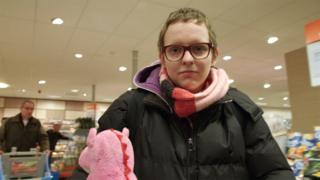
Image copyright
RTL Nieuws, Sander Paulus
The last food shopping trip
And surviving a suicide attempt is not unusual – people do it every day.
Monique Arend, like Aurelia Brouwers, was diagnosed with psychiatric illness including Borderline Personality Disorder. People with this condition may self-harm, have intense feelings of anger, find it hard to sustain relationships, and experience emotional instability. Monique made many attempts to kill herself.
“It happened everywhere – at home, in the forest… But I’m very grateful I’m still alive today,” she says.
Monique is a survivor of violent sexual abuse, and terrifying psychiatric episodes. She thought long and hard about euthanasia.
“I thought I was a big problem for everyone, and I just didn’t want to be that burden, and the pain became unbearable. So I requested the forms for euthanasia, and filled them in. But I never filed them.”
Monique did not file those papers because she found help. In the early days of her illness, a counsellor had advised her not to talk about the abuse – this is when she began to self-harm. But then she found a new therapist who specialised in trauma.
Where to get help
BBC Action Line – information and support
“She told me I’m not crazy, but I’m traumatised – that’s a big difference. We worked very hard together – it was very painful. But we went through it, and since then I’ve been on a recovery trip,” Monique says.
She has written a book about her experiences, and has some advice for people struggling with suicidal thoughts or considering euthanasia in the Netherlands.
“It’s heavy, hard and tough,” she says. “But keep a candle burning. Look for people who can support you. You guys are so powerful because you’ve been through so much – there’s still room for you on this planet.”
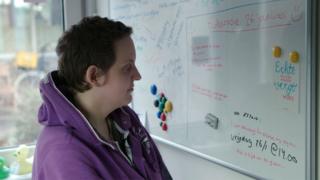
Image copyright
RTL Nieuws, Sander Paulus
Aurelia Brouwers and her whiteboard, with one day to go
The discomfort around euthanasia for psychiatric patients is partly to do with a concern that all options may not have been explored. At the End of Life Clinic in The Hague more than half of those who come seeking euthanasia on psychiatric grounds are turned away because they have not tried all available treatments.
“I had a patient who had a lot of treatments, and was convinced nothing more could help him. But he had never been in a clinic to help with abuse of prescription medicine and alcohol,” says Kit Vanmechelen. “So I said to him, ‘For half a year you must make a real effort to lessen your use of those, and if then you still have a death wish, well, come back and we’ll talk.'”
But Vanmechelen believes that after a patient has undergone multiple treatments for the same diagnosis, it is reasonable to say, enough is enough.
This was what Aurelia Brouwers argued too. She had been treated for her illness – she had therapy and took medication – but we do not know the details.
“We need to get rid of the taboo that you should always remain in treatment, until the bitter end,” she said. “For people like me there isn’t always a solution – you can’t keep taking medicine, you can’t pray indefinitely… At some point you just have to stop.”
But people can and do live for decades with psychiatric disorders.
“They’re not treatable like an infection, they’re like diabetes – you’ve got the disease, you will have it the rest of your life, but we, as doctors, are going to make it possible for you to live with it,” argues Frank Koerselman.
“Like people with diabetes, psychiatric patients are also treated for years, but this is not an argument to stop treatment.
“It’s very well known that after the age of 40 things might go much better for people with Borderline Personality Disorder – their symptoms might become much milder.”

Image copyright
RTL Nieuws, Sander Paulus
Aurelia Brouwers has a quiet moment in the crematorium
Aurelia Brouwers died more than a decade before she reached 40. On her last full day on Earth she was visited by her favourite singer, Marco Borsato. That night, she had dinner with her friends – there was laughter, and a toast. On the morning of 26 January she posted for the final time on social media:
“I’m getting ready for my trip now. Thank you so much for everything. I’m no longer available from now on.”
Aurelia Brouwers’ loved ones assembled in her bedroom. Two medics were in attendance.
“I’m sure that the moment I give the poison – because that’s what you do, you give poison – I’m very sure that is the only thing the patient wants at that moment and has wanted for a long period, otherwise I wouldn’t be able to do it,” says Kit Vanmechelen.
“In the first meeting with a patient, I tell them, this will be the last question I ask you: ‘Are you sure you want this? And if there is a little doubt, we will stop, come back, and talk about it again.'”
And has that ever happened to her?
“No. It doesn’t happen.”
In Aurelia’s case, doctors did not administer the drugs that killed her – she drank the medication herself.
In the RTL Nieuws documentary, she has a last conversation with Sander Paulus, as she holds the small, sealed medicine bottle.
“This is the drink,” she says. “I know it tastes bitter, so I’m just going to drink it down. And then I’m going to sleep.”
Sander Paulus asks her if she has any doubts.
“No doubts,” Aurelia says. “I’m ready – ready to go on a journey.”
“I hope you find what you’re looking for,” he says.
“I definitely will,” is Aurelia’s reply.
Aurelia Brouwers turns her back on Sander Paulus, and climbs the stairs. It is just after 2pm on Friday, 26 January, 2018.
Read more:

When a one-day-old baby, Paul Joseph Fronczak, was stolen from a Chicago hospital in 1964, the terrible story made headlines across America. Then, two years later, an abandoned boy was identified as the missing baby and handed over to the relieved parents. Years later, Paul began to investigate what had happened – and was shocked by what he found.
Read: The FBI said I was my parents’ stolen baby – but I found the truth
Join the conversation – find us on Facebook, Instagram, YouTube and Twitter.



